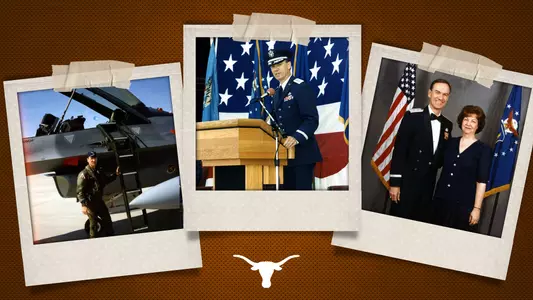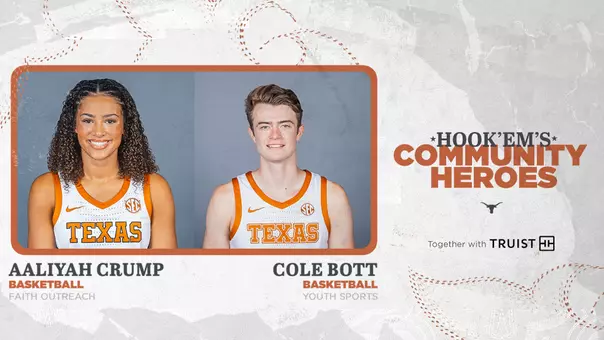The University of Texas at Austin Athletics

Texas Lottery Veteran Recognition: Kenneth E. Eickmann
11.22.2024 | Longhorn Sports Properties / Learfield
The retired Air Force lieutenant general will be recognized when Texas Football hosts Kentucky on Nov. 23.
Kenneth E. Eickmann turned his gift for problem solving and creative thinking into a distinguished United States Air Force career. The retired lieutenant general served for 35 years and completed 22 active-duty assignments, including becoming a commander of the Aeronautical Systems Center at Wright-Patterson Air Force Base in Ohio – the nation's largest center of excellence for research, development and acquisition of aircraft, equipment and munitions.
Graduating from The University of Texas in 1967 with a degree in mechanical engineering, Eickmann dedicated his career to uphold reliability and performance in all aspects of defending the nation.
"We offered the best training, weapons systems, intelligence – everything, so that our pilots had use of the best equipment in the world," Eickmann said.
After completing his undergraduate studies at UT, Eickmann was commissioned from the Air Force ROTC program and went immediately to the Air Force Institute of Technology where he earned a master's degree in systems engineering.
"I was ready to go to work as an engineer. The last thing I wanted to do was go back to school, but you never know what your first assignment is going to be," Eickmann said.
Eickmann's mindset was to do the best possible with whatever assignment he was given – to work hard and help the U.S. Air Force remain the world's most respected air and space force. His second assignment was a three-year appointment as an instructor in maintenance analysis, an opportunity Eickmann embraced, to become a better engineer by teaching others how to think and solve problems. Although his next 20 assignments expanded into logistics and leadership roles, such as executive officer and chief of staff, his approach was primarily that of an engineer.
"We looked at all aspects of an issue," Eickmann said. "We thought about how to reduce costs and determine what was going on with a situation so that we could fix it or improve it."
This included everything from figuring out what was causing engine flameouts in Air Force single-engine fighter jets – a mysterious and dangerous problem that pilots were encountering at altitude but which Eickmann's engineers could not replicate on the ground – to solving supply and maintenance problems on aging aircraft fleets.
During Eickmann's assignment as commander of the Oklahoma Air Logistics Center, the largest military industrial complex in the United States, he played a major role in the rescue and recovery efforts following the Oklahoma City bombing. He also began facilitating cooperative research and development agreements with civilian organizations, and sharing knowledge, expertise and resources to develop materials that serve both military personnel and the public. Projects included improving the lifespan of prosthetic limbs, using F-22 material to reinforce public bridges while reducing the cost of the F-22, and collaborating with a scratch-resistant sunglass manufacturer to make aircraft canopies resistant to erosion from sand in desert environments.
"We went to great lengths and efforts to be good stewards of funds and resources which came from taxpayer dollars," Eickmann said.
After concluding his Air Force career Eickmann returned to UT, where he led the establishment of the University of Texas Center for Energy Security. In that role, and in collaboration with the Air Force and Department of Defense, Eickmann chaired three committees for the National Academy of Sciences and the National Research Council focused on energy efficiency. A member of UT's Mechanical Engineering Academy of Distinguished Alumni, Eickmann is recognized as one of the nation's leading experts in energy and propulsion technology.
Eickmann currently serves as a senior research affiliate at the Center for Electromechanics at UT. His efforts are focused on matching Department of Defense technology needs with UT's vast research capabilities.
Thanks to the Texas Lottery, great things are happening all across Texas. The Texas Lottery now consistently contributes more than $2 billion of lottery revenue each year to good causes like public education and veterans' assistance programs. Beginning with the first veterans' dedicated scratch ticket game in 2009, the Texas Lottery has now contributed over $250 million to the Fund for Veterans' Assistance.
Since 1992, the Texas Lottery has generated more than $39 billion in revenue for the state of Texas. Through strict adherence to their vision, mission and core values, the Texas Lottery is dedicated to ensuring that this support continues.





